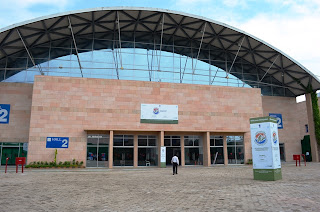7 October 2012, CBD COP 11, Hyderabad, India - Pacific
delegates attending the 11th Conference of the Parties to the
Convention on Biological Diversity met in Hyderabad, India to prepare for the
coming two weeks of negotiations.
The
Convention on Biological Diversity is dedicated to promoting sustainable
development and was signed by 150 government leaders at the 1992 Rio Earth
Summit. It has three key objectives -
The
Pacific meeting was to strategise the plan of action to address the agenda
items of common interest, with a united approach, some of which include the Programme
of Work on Island Biodiversity, Strategic Plan for Biodiversity, and Financial
Mechanisms.
 |
| L - R Nenenteiti Teariki-Ruatu Kiribati, Ratita Bebe Kiribati, Sarah Tawaka Fiji |
"It
is crucial for Pacific Islands to really work together, considering the crucial
items of pertinence to our islands and people within our region, which will be
discussed in this global CBD level,” said Ms. Nenenteiti Teariki-Ruatu, the
Acting Director of Environment and Conservation Division, Ministry of
Environment, Lands and Agriculture.
“Teamwork,
coordination, communication but above all, commitment; is key to effective
participation of Pacific Island Country delegates, this will ensure that the
global process will have positive impacts at our regional and national levels
in the terms of meeting the three objectives of the CBD”
The
Pacific delegates will also be working with the Small Island Developing States
(SIDS) at the CBD COP 11, with preparation and input into a statement at the
opening meeting to be read by Kiribati on behalf of the SIDS.
This
meeting is the first of many to come.
The Pacific delegates will be meeting in the mornings on a regular basis
during the conference, and also hope to meet with other Small Islands
Developing States to prepare each day before joining the Asia Pacific morning
briefings.
 |
| L - R Asterio Appi Nauru, Warwick Harris Marshall Islands, Stuart Chape SPREP, Easter Galuvao SPREP |
The
Secretariat of the Pacific Regional Environment Programme (SPREP) is providing
technical, coordination and communications support at the CBD COP 11 to Pacific
delegates.
Attending
the first Pacific preparatory meeting were delegates from Fiji, Kiribati, Marshall
Islands and Nauru, other Pacific delegates are still en route to India.







